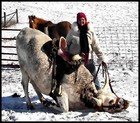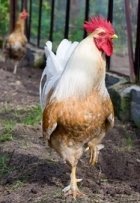Successful Urban Farming on a Shoestring
I was sent this week a stack of magazines from a single magazine company that interviewed me about colony raising rabbits. The end result was this stack of magazines all with different titles, but all basically saying the same thing. Urban farmers want to spend less, however spend more than any group I have seen short of the government when wanting to be self sustaining. Let me explain.
A real farmer is not going to spend $1500.00 US on a pretty little chicken coop that is made for 3-6 chickens, depending on breed of course.
A real farmer isn't going to buy all that fancy stuff or all those books to grow a 20x20 spot of extra food for his home. A real farmer makes things cost effective.
This means that once you buy all those books, all those products to process, and sustain your garden or those 3 chickens you will never in this lifetime get your money back. The big companies know this and that's why one publishing company has 6, count them SIX magazines for urban farmers. The sad thing is most of these people going into urban farming will only be in it for around 5yrs.
Yup! Studies show the average person keeps a hobby for 5 years. They actually loose interest in 3 years but live the final 2yrs in guilt because they don't want to waste all the money they spent trying to save money.
One reason they want out isn't the work, or the expense, its that they aren't getting out of it what they thought they would. They didn't know how to take care of what they bought, before they bought it. If that same person spent one year doing homework on the subject and was talking to actual people doing it, they would have a longer lifespan in that hobby when they do finely jump in.
Farming Basics
Let's look at some things urban farmers can do to make things work. We know that roosters will upset your neighbors. We know that compost piles smell very badly and will also upset your neighbors, especially if you live in a nice neighborhood. (Plop your chickens into your compose heap every day in the summer and they will mull it for you and eat those bugs. It won't smell as bad and the chickens are doing the work for you.)Go out and toss out every single plant you can't eat. Before you do, do some homework on every plant before you toss it. You may learn that roses make great tea, or other edible flowers and plants you have you could have been using, but just didn't know you could.
After you have learned what you do and don't have, toss out what you can't use. Then, decorate your already made landscape and gardens with usable plants. You haven't spent a dime on anything when you do this and often times can sell those old plants for new ones, thus keeping your cost at zero.
Even house plants can be tossed to make room for practical edible plants and herbs that can be grown indoors. I don't buy herbs. I have a shelf above my kitchen sink with a long grow light above it. It’s about 6' long. Nothing special. That one shelf and light costs me little to have but saves me literally hundreds of dollars a year in spices and herbs I don't have to buy. They also taste like they should. This can't be said for the dried herbs that come in sealed plastic containers.
We haven't built one raised garden, or purchased one bag of soil. Yet we have with this little step opened up the idea of a lot of home grown produce. The same can be done with trees. This is a bit more costly to remove pretty trees and re-plant with fruit and nut trees. It will however be much more productive and self-gratifying.
Urban Farming and Trees
And here is a good tip for trees. Buy from someone who has those trees in your area. Don't buy peaches because they are supposed to grow where you are. Buy peaches from someone already growing them in your area. These trees have adapted to your growing seasons and will do much better. Just because a label says its good for your zone, you will always do better buying from your actual zone.Urban Farming with Chickens
Do your own homework, don't rely on someone else that doesn't know anything either to do it for you. Ask breeders, ask hatcheries, then ask breeders again. Hatchery birds almost all lay well. The reason is they aren't pure. If you buy a Rhode Island Red from a hatchery its not really a Rhode Island Red. It is a production red. If you buy a Barred Rock it’s a production rock and so on.
None of those birds are the pure version of what their name implies. Therefore, they will all lay well. Think of it like this. If the parents of those hatchery birds didn't lay well, the hatchery would be out of business, so all the birds they have and sell come from production stock. Heritage birds don't on average lay as well. This is why production stock was added to them, so they can sell the mass quantities needed to stay in business.
I have always wanted a nice quiet bird that is friendly and easy to care for. I want meat and eggs and I want them through the winter. I want a bird that can forage well, and I don't have to spend my last dime to feed. Yes, I’m an Orpington fan. I started many years ago with the buffs and graduated to the blues (which also produce splash and black) about 6yrs ago or so. I hatch out somewhere between 42 and 84 eggs a month and sell very few as I use most of those for the house.
Urban Farming with Ducks
Ducks are also a better pet then chickens, lay a richer egg and meat that far surpasses that of a chicken in flavor. They are easy to raise but cost more to feed and have water as an optional care issue. That is if you have normal ducks.If you choose the Muscovy you don't have noise issues. They don't need water like normal ducks and they have a personality like dogs. I have Cayuga and Muscovy, however if I lived in town, I would only have Muscovy. You do have the flight issue so clipping the wings is a must twice a year. Other poultry such as Guinea hens, Peacocks and so on are not recommended for in town. The reasons are endless.
Urban Farming and Animal Care
When you make the jump from a garden to adding a few small animals you won't need a special high priced pen or house to put them in. If you could see where my flock lives you would die. They need shelter from the wind and rain, that's it - unless you found some really delicate breed that needs to be pampered. I have silkies that just get out of the wind and are fine. We have serious winters here and spring is very wet, yet they don't mind.Ducks need a dog house and fence off your patio. Chickens need a place to lay eggs and get out of the rain. A dog house works great. Mine have a dog house and prefer it to the nice place I made for them. Like kids they would rather play with the boxes than with the gift.
Urban Farming with Goats
If you really jump in and buy goats for milk and cheese get a horse halter that can be used as a cheap goat harness. Put the nose part over the goat’s head and fasten the other part around the waist. Add something soft to the chest area and poof… one goat harness. Now you have something to till your garden. Many small farm places sell hand tillers that work for goats, sheep, small ponies and miniature cattle.Urban Farming with Rabbits
The one critter we have left out of the backyard garden is the rabbit. They are the biggest pet craze to hit since the pot bellied pig. Three breeding rabbits can produce as much, if not more, meat then one cow per year, and costs way less to feed and house.Showing rabbits is fun for the whole family and very inexpensive to do. The normal entry fee is 3-5.00. Rabbits can live on what the family tosses out fixing meals and a few handfuls of hay or grass. Some breeds are very smart and can do agility, rabbit hopping ( how high or how long a rabbit can jump). They can be house trained, and walk on a leash.
Not all breeds are the same. Just like dogs a Doberman is not like a Pug. In rabbits a Flemish Giant is known for being the best of pets, while the Dutch and other smaller breeds are the most popular pets. Meat breeds are nervous and can take more care. They aren't all the same, so once again, do your homework.
Remember if you have a bird dog, it will eat your chickens, if you have a hound, your rabbit won't last long. Always think about what you are doing before you do it and you will have great success and have a lot of fun.
Backyard farming doesn't have to be as hard as all those magazines try and make it seem. Nothing is so delicate it needs the caretaker to hold a doctorate to have it in their garden. It should be easy, and it should be fun. Good luck and plant smart.
By Gypsy, our resident homestead blogger from One Sky Ranch Gypsy's Wanderings Homestead Blog
Video on Urban Farming
Do you have any Urban Farming Advice of your Own?
If you do we would love to read them! Send us your own urban homesteading advice on how to save money when urban farming. You don't kneed any special skills to contribute. As long as you can type and use a keyboard, you will be able to submit your contributions here.
Leave a Comment
Do you have anything that you would like to add after reading this page? We would love to hear your thoughts. If you can add additional information to what has been written here you will be adding value to the website! No need to have any special skills - just type and submit. We will do the rest!
Other Comments
Click below to see comments from other visitors to this page...
Urban homesteading/Dervaes 




Jules Dervaes is your hero? Well, then, you might want to add an encircled "R" after your usage of "urban homestead(ing)f" so as not to get sued by said …
Wow Novella is an Amazing Woman Not rated yet
Novella is an amazing woman. I have hope. It is nearly midnight - but I am going outside to water my garden.
****
Not to milk the goats, …
Love To Read About Your Farm Life - But where Are The Pictures? Not rated yet
I really like to read about your farming life but I would also like to see pictures of your animals, projects you do, and 'stuff around your place'..... …







New! Comments
Do you have something of value to add? Leave me a comment in the box below.